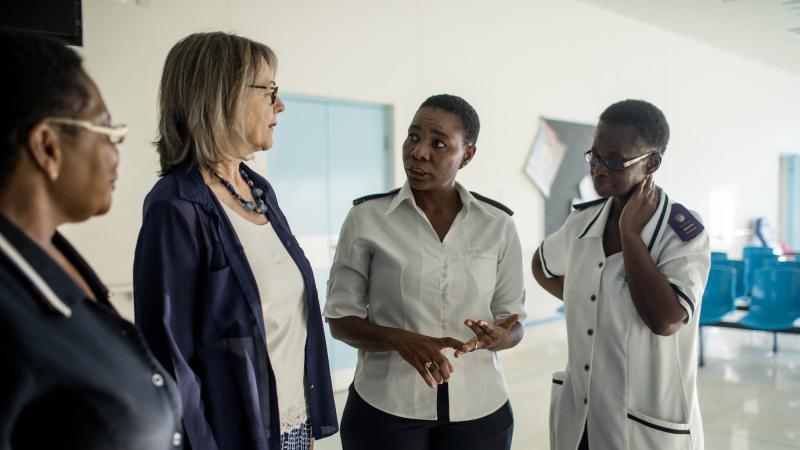Where We Work
See our interactive map


Pamela McQuide (second from left) talks with nurses at Omuthiya District Hospital in Namibia. Photo by Morgana Wingard for IntraHealth International.
Merging technology, clinical expertise, and politics can change public health and Pamela McQuide can show you how to do it.
Pamela McQuide started her career as a nurse. Then she was a community organizer, a public health legislative aide, a family planning and reproductive health researcher, an assistant professor, and the country director for IntraHealth International’s Namibia projects.
Now, she’s a leading expert on health workforce programs at IntraHealth. Her expertise in digital health, nursing, and international development gives her a unique perspective on how to ask the right questions, gather the right data, open candid conversations with health workers, and advocate for their needs.
We sat down with her to discuss the power of nurses and how technology will continue to shape their profession in 2020 and beyond.
I really believe that nursing is a great career with many pathways. Once you’ve become a nurse, there are so many different areas you can go into and grow your career track. I’ve been able to hold many positions, from being a staff nurse to doing policy and research. Being a nurse was critical to that foundation.
For my job at IntraHealth, I’ve traveled to many countries, met with many health workers, and entered many health centers. Because I was a nurse, I can walk into any hospital or facility and talk to health workers about the clinical stuff, not just the research stuff.
When we were developing iHRIS—our free, open source software, that helps countries around the world track and manage their health workforce data—for IntraHealth’s Capacity project, which worked globally to strengthen human resource systems, we decided that we couldn’t think about it as just a technology. We had to consider the voices of the users, which in most cases are doctors or nurses in ministries of health who are entering data into it. My background allowed me to ask potential users what data they wish they had to answer policy questions in their country.
So I think it’s a natural marriage of technological, clinical, and political backgrounds that really helps to discern and align the kinds of systems that are needed with the type of development that you are producing. Because otherwise you can come up with a good system, but if you don’t know those policy questions, you may have made some wrong assumptions.
For example, I conducted a nursing assessment in Kenya to identify the number of nurses that were actually in the country and found that there were a lot of nurses who were going to have to retire in the next five years, which would have left a huge gap in the labor force. They were able to use those data to change policies to allow people to delay retiring and get more people trained in critical key skills areas.
In Namibia we used HIV data to target health centers that needed different kinds of support and care. Data showed us where people weren’t receiving services and allowed us to target them more directly. Once we had good data about viral loads, we looked at ways to more effectively deliver HIV care in the future.
It’s extremely important because nurses are the key to service delivery in most health settings. In primary care in most of Africa where I’ve worked, they only have nurses delivering primary health care and yet their roles and their voices are severely undervalued.
I’m hoping this designation gets nurses recognized as the leaders and important contributors to health care that they are and helps them find their voices in ways they often don’t.
One thing that I’ve seen is, a lot of times, women don’t support other women. But
if nurses stick together, they can change any policy they want. One in four voters in the US is either a nurse or knows a nurse. If we support ourselves, we can make huge changes.I think it’s going back to data for decision-making.
If nurses aren’t empowered to access the right data, interpret them, and use them for advocacy, much-needed services won’t be delivered. It doesn’t matter at what level—whether you are a minister of health or a nurse at a clinic—without data you aren’t able to advocate.We need more digital solutions. I think that as things go forward, we will be using mobile instead of laptops to put solutions in nurses’ and doctors’ hands. They will be able to query on what kinds of services, medications, or treatment somebody needs based on the client’s conditions. But what’s also important is linking those medical records for better data that transfers from site to site.
Lastly, we need to focus on cybersecurity issues. People can use data for the wrong reasons and can misinterpret it. They can use it to identify people who have certain conditions and it can influence their jobs, families, and careers. As much as we need more and better solutions, we need to be watchful about who has access to what data to preserve the confidentiality of individuals.
This piece is part of IntraHealth's celebration of 40 years of commitment to health workers, International Women's Day, and the World Health Organization's Year of the Nurse and Midwife. Join the conversation: @IntraHealth #TheFutureof #HealthWorkersCount #NursesLead #MidwivesLead #IWD2020 #EachforEqual
Throughout 2020, we’re celebrating nurses and midwives and pushing for changes that shift power and authority to them. You can get involved:
To get stories and results like these delivered to your inbox, sign up for our mailing list.
Get the latest updates from the blog and eNews




